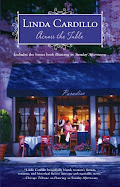
I grew up watching my mother cook with no recipes at all except what was in her head. She would taste and adjust, with a handful of chopped parsley or a fragment of cheese hand-grated and tossed into the pot. I used to think that she had been born with the knowledge of how to cook, something she had absorbed in the womb.
Following a cookbook was a new experience for me, but I threw myself into learning how to produce the dishes Bobby had grown up with. Once a week I took the T to his apartment in Kendall Square near MIT, carrying a shopping bag filled with ingredients I’d never seen in my mother’s pantry.
One of the first dishes she learns how to create is pot roast. Here is my favorite version. The secret to its rich flavor is the combination of garlic, thyme and red wine:
Pot Roast
1 large onion
2 large carrots
3 large cloves garlic
3-4 lbs. beef chuck roast
3 tablespoons flour
½ cup olive or canola oil
2 cups beef broth
1 cup red wine
1 tablespoon thyme
1 large bay leaf
1. Peel and chop onion, carrots and garlic into small dice.
2. Pat the beef dry. Place flour in a plastic bag and season with salt and pepper. Add beef and toss until coated with a layer of flour.
3. Heat oil in a Dutch oven and brown the beef on all sides. Remove from pan.
4. Add chopped onion, carrots and garlic to pan and sauté until onion is golden, scraping up bits of meat from bottom of pan.
5. Add beef to vegetables.
6. Add beef broth, wine, thyme and bay leaf.
7. Bring liquid to a boil, then lower heat to a simmer.
8. Cover and cook on low heat for about two hours.
9. Serve with noodles.









